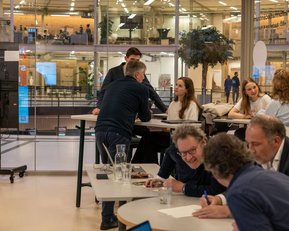
As part of its research program, SRH Haarlem University of Applied Sciences has started with research on a new topic which is launched in 2021 by the European Commission as part of its Green Deal: Twin Green and Digital Innovation.
As part of its research program, SRH Haarlem University of Applied Sciences has started with research on a new topic which is launched in 2021 by the European Commission as part of its Green Deal: Twin Green and Digital Innovation.

As part of its research program, SRH Haarlem University of Applied Sciences has started with research on a new topic which is launched in 2021 by the European Commission as part of its Green Deal: Twin Green and Digital Innovation. Hitherto, green and digital innovation represent two leading but still separated trends that eventually affect all business. The combination of digital and green innovation of business is a more recent approach introduced by the European Commission and has been marked as a priority for European business in the next decades.
Increasingly, Twin innovation is adopted by larger corporations as an answer to the pressure from internal and external stakeholders. Yet, Small and Medium Sized Enterprises (SMEs) are lagging behind. They will have to catch up with the Twin green and digital innovation due to a combination of increasing pressure from different stakeholders including government, corporate clients and increasingly their customers. SMEs in Europe are facing a number of challenges to invest in twin innovation including a lack of general knowledge and the fear of high costs and a lack of benefits associated with Twin innovation.
Therefore, we embarked on research in the Netherlands to better understand the opportunities and implications of Twin innovation for SMEs.
As a first result we conducted research about Twin innovation in the construction sector, a sector in which SMEs are strongly lagging behind larger companies. We compared the adoption level of Twin innovation between large companies and SMEs and interviewed experts and management in Dutch construction companies Dura Vermeer and Stamhuis to better understand the reasons behind lower adoption levels and the impact of Twin innovation.
The results of the study were presented and discussed with researchers last September at the 18th European Conference on Innovation and Entrepreneurship in Porto, Portugal. The findings and recommendations are also shared and discussed with the companies involved in the study to strengthen their understanding and adoption of Twin Innovation in the company and among their suppliers and customers.

Text us for faster responses, and we will do our best to answer quickly! Get personal guidance.